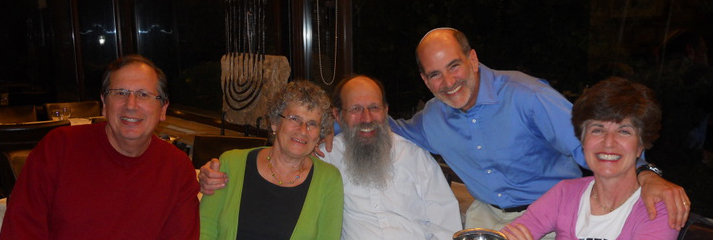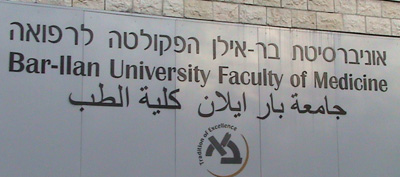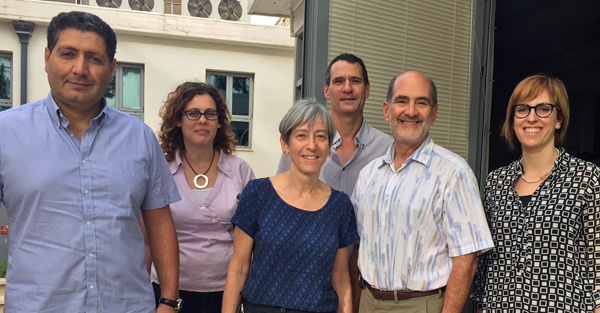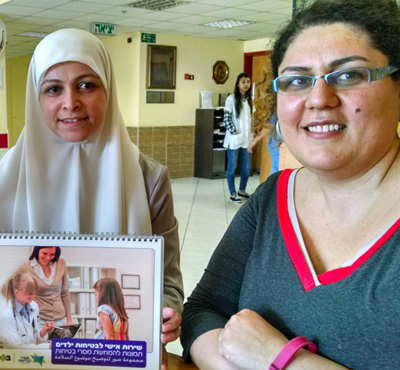Marc Rivo, WONCA Fellow – what is he doing now?
 Photo (l to r) : Bar Ilan University Medical School Dean Ran Tur Kaspa, Associate Dean for Medical Education Micky and wife Susan, Marc Rivo and wife Karen
Photo (l to r) : Bar Ilan University Medical School Dean Ran Tur Kaspa, Associate Dean for Medical Education Micky and wife Susan, Marc Rivo and wife Karen
Marc Rivo, MD MPH, past WONCA editor (2001-2010) of WONCA News,
received the prestigious WONCA Fellowship, in Rio, in November 2016. The
current WONCA Editor asked him to write about his activities and
passions. Marc is President of the Southeast Region of the American
Friends of Bar Ilan University, and supporter with his wife Karen of the
BIU Medical School and its Department of Population Health. He has
chosen to write about his involvement in the BIU hoping it is of
interest to WONCA Members. Marc can be reached at MarcLeeRivo@gmail.com
Improving People’s Health in the Galil : The Role of Family Medicine, Population Health and Israel’s Newest Medical School
In June 2016, Israel’s new Bar Ilan University (BIU) Medical School in Safed (Tsfat) graduated its first class of physicians. This article describes the unique communities of the Galil, the history of family medicine in Israel and WONCA, and the role of the BIU’s Family Medicine and Population Health faculty in meeting the health needs of this diverse region.
Northern Israel’s topography, history, and cultures make it one of the unique places of the world and a popular tourist destination. The African Rift Valley, fed by snow-capped Mount Hermon flowing down the Jordan River to the Sea of Galilee, provides sustenance to millions of migrating birds. The monumental ruins of Beit She’an and Megiddo, popularized in James Michener’s “The Source”, document the region’s importance to great civilizations of the Fertile Crescent over three millennium. The Galilee’s hills and mountains provide a comfortable climate with majestic views, waterfalls, nature reserves and hiking trials.
The biblical cities of Tiberias and Safed are Jewish communities continuously inhabited for over 2,000 years and home to the great Rabbis of the Talmud, Kabbalah and other holy texts; while Nazareth and the Sea of Galilee are home to Jesus, Mary and Christianity’s birthplace, as well as Israel’s largest population of Muslim Arab citizens. Northern Israel today is home to one of the world’s most diverse populations, with ultraorthodox (Haredim) and secular Jews, Ethiopian, Russian, North African and Indian immigrants, and Druze, Christian and Muslim Arabs, with Arabs and Jews in about equal numbers, living peacefully in Northern Israel to the borders of Jordan, Lebanon and Syria.
Significant social and health disparities are found in the north compared with the center of Israel (Tel Aviv, Jerusalem and surroundings). Salaries are lower by 35%, a third of the region's population lives in poverty, with higher poverty rates in certain Haredi Jewish and Arab communities. The majority of towns rate three and lower on the national socio-economic 10 step ladder. Infant mortality, unintentional injuries, chronic illnesses and disabilities are also more common. Alongside poorer health, access to healthcare services is more limited in the Galilee. There is a major shortage of hospital beds, physicians and specialized services relative to the center.
In 2009, the Israeli Government unanimously selected Tsfat (Safed) as the site and Bar Ilan University to open Israel’s 5th medical school and first in 34 years. The poor socioeconomic and health disparities of North Israel, and the need to enhance the physician workforce and health system to serve a diverse Arab and Jewish community contributed to this historic decision. (
more)
 Photo : Bar Ilan University Faculty of Medicine sign, in English, Hebrew and Arabic.
Photo : Bar Ilan University Faculty of Medicine sign, in English, Hebrew and Arabic.
Family Medicine and Population Health were key components of BIU’s new Medical School, with its mission to embrace the community, upgrade health care, and effect positive change in the region. Professor Michael “Micky” Weingarten, an Oxford and London University graduate, and Chair of Family Medicine at Tel Aviv University, was selected to serve as the Founding Vice Dean for Medical Education for the Medical Faculty of the Galilee (JPEG 2). Dr Bishara Bisharat, is head of the EMMS Hospital (known locally as the Scottish or English Hospital) in Nazareth, a 150 bed hospital with more than 50,000 annual emergency department visits and 2,000 annual births, and which serves a predominantly Christian and Muslim Arab population. In addition, Dr Bisharat chairs the BIU Faculty of Medicine’s Social Accountability Committee.
Today, Dr Zofia Eilat-Zan'ani serves as Chair of the BIU Faculty of Medicine’s Department of Family Medicine. Israeli medical schools introduced compulsory rotations in Family Medicine in the 1960's and established Family Medicine residency programs in the early 1970s. Family medicine rotations exist in all medical schools. All 110 BIU medical students spend one month in Family Medicine in their final year, a project that involves approximately fifty family physicians across the Galil. The Galilee's family physicians are excellent role models embedded in the fabric of the local community and culture.
BIU’s Department of Population Health, led by Professor Mary Rudolf, aims to improve the health and wellbeing of the diverse communities in Northern Israel through an early-childhood-years research center, medical education and training in population health, and a social incubator for innovative ideas for improving health springing from the
community.
A world renown specialist in pediatrics, childhood nutrition and obesity prevention, Professor Rudolf and her colleagues at Leeds University, UK established the innovative Project HENRY (Health Exercise and Nutrition in the Really Young) to improve childhood health.
HENRY was adopted as a national model in the United Kingdom and now being piloted in underserved Arab and Jewish communities in Israel.
 Photo : Head of the Department of Population Health, Professor Mary Rudolf (center), with Dr Sivan Spitzer-Shohat (right) and the Project ETGAR team with Marc Rivo second from right.
Photo : Head of the Department of Population Health, Professor Mary Rudolf (center), with Dr Sivan Spitzer-Shohat (right) and the Project ETGAR team with Marc Rivo second from right.
Professor Rudolf and Dr Sivan Spitzer-Shohat, a sociologist and Rivo-Essrig Research Fellow in Population Health, direct an innovative hospital discharge and transition of care program involving medical student home visits called Project ETGAR (JPEG 4). Funded by Israel’s Council on Higher Education, ETGAR seeks to understand the social-cultural determinants of health and assure their newly discharged patients are receiving the recommended medical and social services. Professor Rudolf, Dr Spitzer-Shohat and Dr Jumanah Essa-Hadad direct Project Rafael, which selects and provides seed grant money and technical assistance to promising community based organizations (JPEG 5).
 Photo: Dr Jumanah Essa-Hadad from the Department of Population Health (right) with a volunteer educator teaching safe newborn care to new Arab mothers at the Italian Hospital in Nazareth
Photo: Dr Jumanah Essa-Hadad from the Department of Population Health (right) with a volunteer educator teaching safe newborn care to new Arab mothers at the Italian Hospital in Nazareth
The Bar Ilan Faculty of Medicine in the Galilee, with its family physician and population health leadership, is on the way to fulfilling its mission as a socially responsive medical school for the unique, diverse population it serves in Northern Israel.
In “WONCA: The First 20 Years”, David Game, WONCA President and first WONCA News Editor, chronicled Israel’s participation among the 13 founding member countries attending the first WONCA World Conference in Melbourne in 1972. In 1989, the Israel Association of Family Physicians, with Professor Yair Yodfat as Chair and Dr Giora Almagor as Coordinator, hosted the 12th World Conference on Family Medicine held in Jerusalem.
> Next month WONCA News hopes to feature Dr Dan Ostergaard, another new Fellow of WONCA